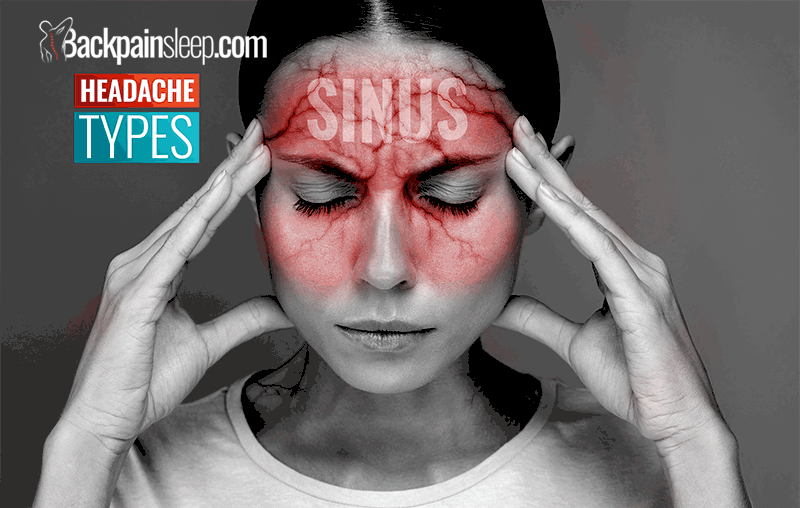What are the four different types of headaches?
The four different types of headaches are the following:
- Tension Headache
- Migraine Headache
- Cluster Headache
- Sinus Headache


What are the symptoms of a migraine?
Migraines are debilitating neurological disorders triggered by the dilation of blood vessels in the brain. The symptoms of a migraine can be quite diverse. They may include nausea, vomiting, photophobia (sensitivity to light), phonophobia (sensitivity to sound), and osmophobia (sensitivity to smells).
The most common cause of migraines is unknown. However, there are some triggers for migraines that have been identified. These include stress, lack of sleep or irregular sleeping habits, changes in weather or barometric pressure, certain foods such as aged cheeses or nitrates found in cured meats and hot dogs.
What are the symptoms of cluster headaches?
The symptoms of cluster headaches are the following:
- Painful feeling in the area of one eye or temple
- Painful feeling in one or both jaws
- Sensitivity to light and sound
- Flashes before eyes
- Nausea and vomiting
- Tingling sensation on the side of the face, head, neck, or shoulders
What are the symptoms of tension headaches?
Headaches are the most common type of pain in the body. They are usually mild and can be treated with over-the-counter medication. But, some headaches may be more intense and require medical attention.
Tension headaches are a type of headache caused by tightness or contraction in the muscles of the neck, face, scalp, jaw, or other parts of the head and neck. It is often accompanied by pain on one side of the head. The pain is usually constant but can also come in waves. Other symptoms may include redness or swelling around the eyes and ears on that same side, as well as difficulty chewing or swallowing.
What are the symptoms of sinus headaches?
Sinus headaches are a common type of headache caused by swollen sinuses. If you have a sinus headache, you may experience symptoms such as:
- A feeling of fullness or pressure in your facial area or around your eyes.
- Pain in your forehead, temples, and cheekbones.
- Nasal congestion and difficulty breathing through the nose.
- Feeling feverish and chilled at the same time.
- Pain or pressure on one side of your face or head worsens when you bend over or lie down.
How can I prevent headaches from happening?
You can prevent headaches by taking care of your body. You should drink enough water, sleep enough hours, eat healthy meals, and exercise regularly.
There are many over-the-counter medicines that you can buy to help with the pain. You can also take some medication to help with the pain. You should always talk to your doctor before you take any medicine, though.
What should I do if I have a headache?
The first thing you should do is drink some water and eat something. You can also take a painkiller to relieve the pain. If it doesn’t stop, call the doctor or go to the hospital as soon as possible.
How can you treat a tension headache?
Tension headaches are the most common type of headache. They are caused by stress, anxiety, and muscle tension. Experts agree that the best way to treat a tension headache is to relax the muscles in the neck shoulders and take deep breaths.
To prevent tension headaches, you can do things like avoiding caffeine or alcohol before bedtime, exercise, practice relaxation techniques like meditation or yoga, and take care of your general health with regular sleep habits and healthy food choices.
How can you treat a migraine headache?
There are two types of migraine headaches: episodic and chronic. Episodic migraines happen less than 15 times per month, while chronic migraines occur more than 15 times per month. The treatments for episodic and chronic migraines are different.
Treatment for Episodic Migraine Headache:
The treatment for an episodic migraine is generally with medication and lifestyle changes. Some common medications include triptans, NSAIDs, and anti-depressants. For lifestyle changes, some people find that avoiding their triggers can help them reduce the number of migraines they get each month.
Treatment for Chronic Migraine Headache:
A chronic migraine headache is an intense, recurring pain that affects over 10% of the population. The most common type of chronic migraine is called menstrual migraine. They are three times more likely to happen in women and can happen on the first day of their period.
How can you treat a cluster headache?
Cluster headaches are severe headaches that occur in clusters. They are characterized by intense, stabbing pain on one side of the head. Cluster headaches can last from 15 minutes to 3 hours.
The most common treatment for cluster headache is sumatriptan. It is a drug often prescribed to people who have had cluster headaches before. The drug has been found to be effective for relieving the symptoms of cluster headaches. Still, it can cause side effects such as chest pain, difficulty breathing, and heart palpitations.
When someone has had a few cluster headache episodes, they may want to try preventative treatment with verapamil or lithium carbonate.
How can you treat a sinus headache?
Sinus headaches are painful and uncomfortable. They affect the sinuses, which are located near the nose and eyes. A sinus headache can be treated by taking pain medication such as ibuprofen or acetaminophen. Breathing temporarily through your mouth can relieve pressure on the sinuses.
If these treatments or approaches aren’t successful , sufferers should always see a doctor who will prescribe stronger pain medication or other treatments such as antibiotics, nasal spray, or surgery.




